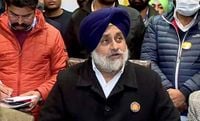On May 7, 2025, tensions escalated in the Jammu and Kashmir region as the Shiromani Akali Dal (SAD) condemned a deadly attack by Pakistani forces on a gurdwara in Poonch, resulting in the deaths of three Sikhs. This incident occurred amidst a backdrop of intense cross-border shelling, which left at least 12 people dead and 57 others injured across the region.
The deceased have been identified as Amrik Singh Ji, a raagi Singh, Bhai Amarjeet Singh, and Ranjit Singh. In a heartfelt social media post, SAD chief Sukhbir Singh Badal expressed solidarity with the families of the deceased, stating, "Strongly condemn the inhuman attack by Pakistani forces on the sacred Central Gurdwara Sri Guru Singh Sabha Sahib in Poonch, in which three innocent Gursikhs, including Bhai Amrik Singh Ji, Bhai Amarjeet Singh and Bhai Ranjit Singh lost their lives." He further demanded that the martyrs be honored for their sacrifice and that adequate compensation be provided to support the bereaved families during their time of grief.
Punjab Chief Minister Bhagwant Mann also condemned the incident, asserting, "Targeting the common people is completely wrong." He conveyed his heartfelt condolences to the bereaved families and emphasized the need for peace, stating, "It is a prayer to Guru Sahib that He may place the departed souls at His feet and give strength to the families to bear this unbearable pain." The incident has drawn widespread condemnation from various political leaders and organizations.
This tragic event unfolded shortly after the Indian Armed Forces conducted 'Operation Sindoor' in the early hours of the same day, targeting nine terror camps in Pakistan and Pakistan-occupied Jammu and Kashmir (PoJK). This operation was a direct response to the April 22 Pahalgam terror attack, in which 26 civilians lost their lives. The Indian Army, Navy, and Air Force collaborated in this operation, marking the deepest military strikes into Pakistani territory since 1971.
In the aftermath of Operation Sindoor, Pakistan retaliated with heavy artillery and mortar shelling along the Line of Control and the International Border. Reports indicate that the shelling began around 1 a.m. and continued until 6 a.m., causing significant damage to civilian infrastructure and instilling panic among residents. Visuals from the affected areas depicted shattered windows, damaged homes, and debris scattered across the streets.
According to local sources, the shelling resulted in the deaths of 15 civilians, with 43 others sustaining injuries. The worst-hit areas included Poonch and Rajouri districts, where residents were forced to flee their homes in search of safety. Union Home Minister Amit Shah underscored the government's commitment to civilian safety, directing immediate evacuations from the border districts.
Eyewitness accounts from residents painted a harrowing picture of the night-long assault. One resident from Mendhar described the chaos, saying, "The shelling began at 1 a.m. and continued till 6 a.m. Everything was damaged." Another family recounted their narrow escape from their damaged home, expressing uncertainty about their future: "We have to leave the village, but don't know where we will go." In Poonch town, community leaders like Narendra Singh, head of the Shiromani Gurdwara Parbandhak Committee, lamented the loss, stating, "We have suffered an unimaginable loss. The town is densely populated and the shelling was relentless. We've opened the doors of our temples and gurdwaras to provide shelter, but many residents are now fleeing."
As families sought refuge, the local markets were shuttered, and the streets grew eerily quiet. The fear of further violence loomed large, with many residents vowing not to return until peace was restored. The devastation was not limited to human loss; physical damage was extensive, with reports of homes reduced to rubble and many injured residents requiring immediate medical attention.
Meanwhile, the Indian government maintained that the strikes carried out during Operation Sindoor were necessary to disrupt terrorist activities. Over 80 terrorists were reportedly killed in the operation, targeting camps associated with groups like Lashkar-e-Taiba (LeT) and Jaish-e-Mohammed (JeM). Notably, Jaish chief Masood Azhar was said to have lost 10 family members in the strikes, highlighting the operation's significant impact on terrorist networks.
As the situation continues to develop, the Indian government faces mounting pressure to ensure the safety of civilians while addressing the broader security concerns posed by cross-border terrorism. The tragic deaths of innocent civilians in Poonch have further complicated an already tense situation, prompting calls for accountability and justice.
In light of these events, the Shiromani Akali Dal and various political leaders have reiterated their support for the armed forces while condemning the targeting of civilians. The sentiment echoed throughout the region is one of grief, anger, and a desperate plea for peace. As families mourn their losses and communities grapple with the aftermath, the hope for a resolution remains tenuous amidst ongoing hostilities.


